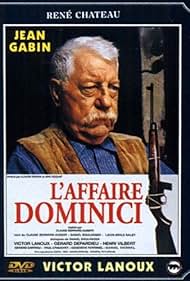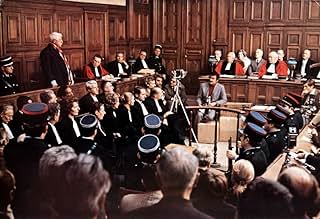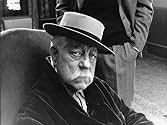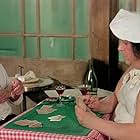It is hard to believe that Madame la Guillotine claimed her first victim in 1792 and was still going strong in 1977!
Opponents of capital punishment have always maintained that it is ineffective as a deterrent and that there have been too many 'miscarriages of justice'.
It is a highly emotive debate but it is certain that had not Gaston Dominici had his death sentence quashed and been released from prison on grounds of ill health then he too would have joined the list of the victims of blind justice.
The compromises of film dictate that so many details of the case have been omitted here but all things considered it is still pretty effective. Filmed on location where the events took place it contains some strong performances and the trial scene is excellently handled.
Police are baffled by the apparently motiveless murder of an English scientist, his wife and ten year old daughter near their car in the sleepy French town of Lurs. Disgusted by the crime, especially after seeing the corpse of the girl, Commissaire Sebeille, very well played by Paul Crauchet, makes it his mission to find the murderer(or murderers). Eventually, almost out of desperation, Sebeille seizes upon circumstantial and contradictory evidence that points towards Gaston Dominici, the patriarch of the farm close to the murder scene, a great performance by Jean Gabin in which he instils a lifetime's experience in front of the camera. Domenici does not do himself any favours at the trial, the presiding judge is biased and despite one of his sons admitting perjury, the jury's verdict is predictable.
There have been some very good French films through the years that show the deeply unpleasant undercurrents of rural life notably Becker's 'Goupi Mains Rouges' and although this film is not in the same league, none of the protagonists in this emerge smelling of roses.
Mention must be made of Daniel Ivernel as the judge and Evi Maltagliati as the almost wordless but highy expressive Madame Dominici. As Domenici's simple-minded nephew we have the charismatic Gérard Depardieu; moving up the ranks and just a year away from the first of his collaborations with Bertrand Blier.
The theme of a faulty judicial system is ideally suited to André Cayatte but here we have Claude-Bernard Aubert. He was unable to build on this and went on to direct porn films under the name Burt Tranbaree.
It is left to the television film of 2003 to give a fuller account and advance the theory that the killing was committed by the KGB. There is also a tantalising documentary from 1955 begun by Orson Welles and typically, unfinished.
It is highly unlikely that we will ever know who slaughtered the family Drummond. This case is yet another grim reminder of Byron's observation: "Truth is stranger than fiction."
































